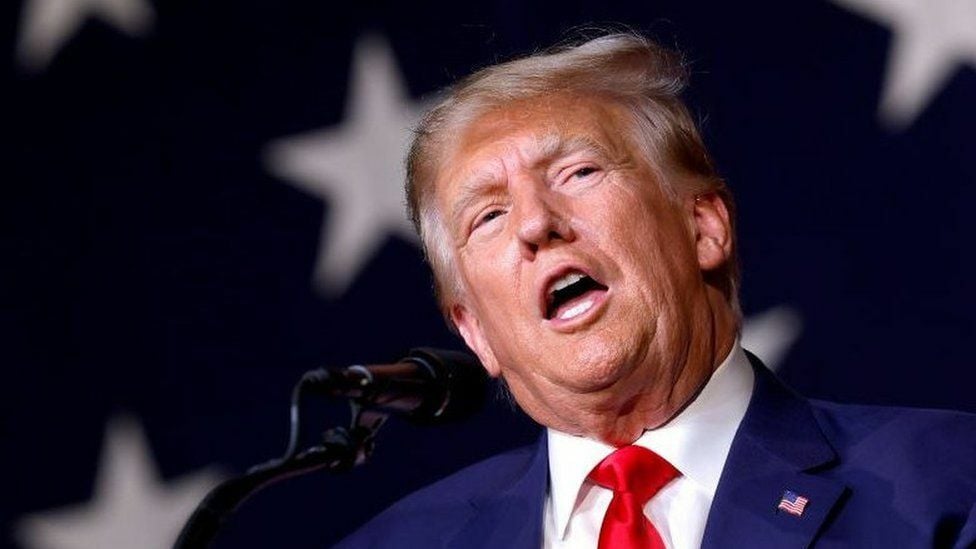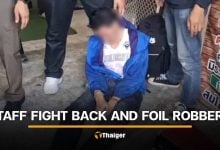Trump pleads not guilty amid showmanship and Republican unease

The indictment of Donald Trump unfolded in two distinct arenas on Tuesday afternoon – a federal courtroom in Florida and the realm of public opinion. Within the Miami courthouse, Trump and his legal representatives maintained a composed demeanor. A lawyer for the former president informed the judge that Trump was pleading not guilty to all charges. Discussions ensued regarding the type of contact he could have with potential witnesses, and Trump was released without any restrictions on his travel.
In contrast, outside the courtroom, and across social media platforms, the atmosphere was markedly different. Throughout the day, the former president posted on his Truth Social website, lambasting special counsel Jack Smith and questioning why investigations into alleged crimes by Democrats were not being pursued. “One of the saddest days in the history of our country,” he wrote. “We are a nation in decline!!!”
Trump’s most striking response to his arraignment was a more subtle political move, executed with his usual flair for showmanship. His motorcade stopped at Versailles Restaurant, a Cuban café and bakery popular with Little Havana locals and tourists alike. There, he engaged with patrons, shook hands, posed for photos, and made brief remarks. The scene resembled a typical meet-and-greet for a campaigning politician in a key battleground state, indicating that Trump’s bid for the White House continues, regardless of the indictments.
This development is not particularly welcome news for Trump’s Republican presidential competitors, who are grappling with how to react to the former president’s latest indictment. Some, like former governors Chris Christie and Asa Hutchinson, have criticised Trump’s conduct and called for him to end his campaign. Ron DeSantis, who is closest to Trump in the polls, has focused his criticism on federal prosecutors, perhaps reflecting his wariness of alienating Trump supporters, who frequently view him as their second choice.
Former Vice-President Mike Pence and Trump UN Ambassador Nikki Haley are attempting to strike a balance between criticising their Republican rival without provoking his supporters’ ire. Haley, for instance, recently criticised the indictment as “not how justice should be pursued in our country” but also slammed Trump for being “incredibly reckless” with US national security. Despite this, she stated that she would be “inclined” to pardon Trump if she were to become president, arguing that it would be “terrible for the country to have a former president in prison for years because of a documents case.”
The situation becomes increasingly complex as many Republican politicians seem to be adopting a more combative stance. House Speaker Kevin McCarthy declared that Republicans “won’t stand for” the indictment, and GOP members are promising an aggressive investigation into the Justice Department’s handling of the case. Senator JD Vance of Ohio threatened to slow down the confirmation of three of President Biden’s nominees to the Justice Department, vowing to “grind his department to a halt.”
As Trump’s indictment increasingly becomes framed as a clash between Biden and the Republicans, any criticism of the former president risks being seen as providing support to political opponents. This could obscure the real enigma at the heart of this new indictment and what might be Trump’s greatest weakness in this case. While the motive behind Trump’s first indictment in New York seems clear, the charged business fraud crimes involve an unusual interpretation of state law. In the federal case, the crimes are more straightforward, accusing Trump of mishandling sensitive government information, obstructing a federal inquiry, and lying to federal investigators. However, the motive remains unclear.
Trump’s rivals may want to make him answer these questions and do so in a manner that convinces Republican voters that he does not deserve to be the party’s nominee. To succeed, they might have to make the former president explain himself.
Latest Thailand News
Follow The Thaiger on Google News:


























